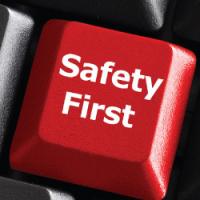- Posts: 350
- Thank you received: 11
Housekeeping for Safety
- Safety Toolbox Talk Webmaster
-
 Topic Author
Topic Author - Offline
- Administrator
-

Most of you probably have house cleaning responsibilities at home. For some of you, it's a regular weekly chore. Whatever the case may be, you'll agree that good housekeeping practices are important at home.
However, what we sometimes overlook is that good housekeeping is a key duty on the job, too. The orderly arrangement of work areas is vital to the safety of all workers, regardless of whether they are involved with machines and tools or with appliances and furniture.
It's a fact that approximately 6,000 persons are killed on the job annually in the United States, and an estimated 19,500 in home accidents.
Seventeen percent of the on-the-job deaths are caused by falls, many of which result from just plain poor housekeeping practices.
Falls often result from tripping over loose articles such as tools left in aisleways and work areas. Wet spots on the floor, or trash and other articles left in stairways also take their toll.
During periods of rain and snow, you know what happens when you and the kids track water into the house from outside. Tracked-in water is a serious problem at work, too. Wet spots cause slips and falls. They should be cleaned up immediately, regardless of who was responsible for their being there.
We have trash receptacles placed in several strategic areas, so there is no excuse for waste paper, pop bottles, or other materials being thrown on the floor.
You'd better get in close for a sure shot at the trash barrel.
A word of caution. If a bottle should be broken on the floor, don't attempt to pick up the glass with your bare hands, Wear gloves or sweep up the pieces. The same procedure should be used for cleaning up nails and other sharp objects.
Let's face it. It is just a lot easier to do your job when your work area is kept neat. Keep your tools and equipment off the floor and stored in the proper places. This not only reduces tripping hazards, but protects the equipment you use to earn a living with.
Did you ever go to your closet at home to get your golf clubs and have to pull them out from under some other articles? Things start falling all over. It's a mess. But before you blow your cool, stop and think. "How many times have I left stuff piled on top of the golf clubs when I was in a hurry looking for something else in the closet?"
The same principles apply when storing materials or equipment on the job. Take time to make the piles neat. It's unsafe to stack them too high and, if possible, it's best to keep them away from other equipment or articles that are used often.
We have to be a lot like a quarterback, keeping our eyes open for changes in the defense or certain other telltale moves of opposing players. On the job, we should keep a lookout for danger signals - loose flooring, articles out of place, or other unsafe conditions. These things should be corrected immediately, or notify me and I'll see that they're taken care of.
In closing, I'd like to emphasize that we're all dependent on each other for safety. It's up to each of us to hold up our end of the deal. When each of us keeps their own area in order, the whole plant is a safer place to work.
Please Log in or Create an account to join the conversation.
